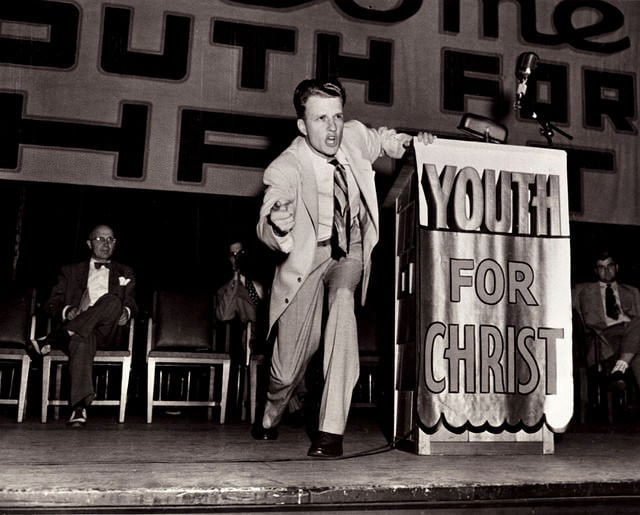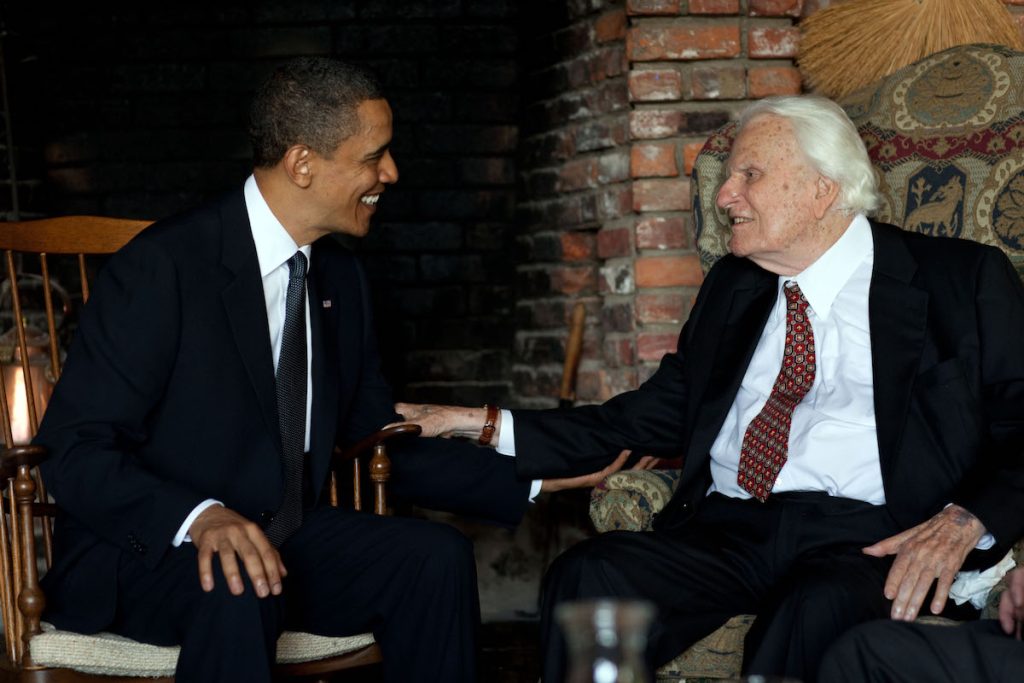 CHICAGO, IL (February 27, 2018) – In the days following Billy Graham’s passing last week, there have been a slew of articles opining on his life and legacy. Those articles have ranged from hagiography to demonization. It’s caused me to wonder again about questions for which there probably are no easy answers: Can we let our heroes—and each other—be imperfect? If so, how imperfect? How much of a person’s past can we forgive? Can we accept that there are others who disdain people we admire and ask whether their criticisms have some validity? Can we understand when others admire those whom we disdain?
CHICAGO, IL (February 27, 2018) – In the days following Billy Graham’s passing last week, there have been a slew of articles opining on his life and legacy. Those articles have ranged from hagiography to demonization. It’s caused me to wonder again about questions for which there probably are no easy answers: Can we let our heroes—and each other—be imperfect? If so, how imperfect? How much of a person’s past can we forgive? Can we accept that there are others who disdain people we admire and ask whether their criticisms have some validity? Can we understand when others admire those whom we disdain?
We published a story with reactions from Covenanters who shared how they gave their lives to Christ at a Billy Graham crusade or how he inspired them into ministry. Others said that while they respected him, they struggled over what they perceived to be his focus on personal evangelism without addressing social justice issues. Covenanter Stephanie Williams O’Brien, a longtime friend of the Graham family shared her thoughts on the evangelist’s legacy with Minnesota Public Radio.
Graham’s words and actions on race, sexuality, and politics have been the focus of many articles. Some writers reflecting on his regrets, others his failures. In one of Christianity Today’s numerous articles on Graham’s legacy, the publication asked, “What is Billy Graham’s Friendship with Martin Luther King Jr. Worth?” and noted that “Contemporary Christians have a mixed take on the late evangelist’s civil rights record.” CNN’s article “Where Billy Graham ‘Missed the Mark’ goes into deeper detail about that record.
Many in the LGBTQ community have lambasted Graham for having said same-sex relationships were a “sinister form of perversion.” Others, including conservative columnist George Will, wrote that “Billy Graham was no prophet” and criticized Graham for cultivating an image of being apolitical, while effusing praise for Republican candidates, such as when he called Richard Nixon, “the most able and the best trained man for the job probably in American history,” and saying God had given Nixon, “supernatural wisdom.”
 Most writers, however, note that Graham regretted and repented over much of what he had said and done—or not said and done—and which he had come to see as harmful and contrary to the teachings of Jesus. In his article “Billy Graham, ‘America’s Pastor,” Princeton history professor Kevin Kruse writes, “In remembering Graham, we must reckon with both halves of his career — the quarter-century he spent working as a shrewd political insider, and the slightly longer span he spent atoning for it.”
Most writers, however, note that Graham regretted and repented over much of what he had said and done—or not said and done—and which he had come to see as harmful and contrary to the teachings of Jesus. In his article “Billy Graham, ‘America’s Pastor,” Princeton history professor Kevin Kruse writes, “In remembering Graham, we must reckon with both halves of his career — the quarter-century he spent working as a shrewd political insider, and the slightly longer span he spent atoning for it.”
Tom Krattenmaker, who shared neither Graham’s theological or political viewpoints, still wrote, “In these days of passionate debate, many of us are out on the metaphorical hustings and circuits arguing our cases and promoting our causes. Liberal or conservative, religious or not, we all seem to be evangelizing these days. If we can do it more like Billy Graham, we will make a lot fewer enemies in the process.”
The opinions don’t necessarily answer the questions, but hopefully they will cause us to ask our own and contemplate how history will one day judge our legacy.
Commentary, News
Who Do People Say Billy Graham Was? It Depends
We published a story with reactions from Covenanters who shared how they gave their lives to Christ at a Billy Graham crusade or how he inspired them into ministry. Others said that while they respected him, they struggled over what they perceived to be his focus on personal evangelism without addressing social justice issues. Covenanter Stephanie Williams O’Brien, a longtime friend of the Graham family shared her thoughts on the evangelist’s legacy with Minnesota Public Radio.
Graham’s words and actions on race, sexuality, and politics have been the focus of many articles. Some writers reflecting on his regrets, others his failures. In one of Christianity Today’s numerous articles on Graham’s legacy, the publication asked, “What is Billy Graham’s Friendship with Martin Luther King Jr. Worth?” and noted that “Contemporary Christians have a mixed take on the late evangelist’s civil rights record.” CNN’s article “Where Billy Graham ‘Missed the Mark’ goes into deeper detail about that record.
Many in the LGBTQ community have lambasted Graham for having said same-sex relationships were a “sinister form of perversion.” Others, including conservative columnist George Will, wrote that “Billy Graham was no prophet” and criticized Graham for cultivating an image of being apolitical, while effusing praise for Republican candidates, such as when he called Richard Nixon, “the most able and the best trained man for the job probably in American history,” and saying God had given Nixon, “supernatural wisdom.”
Tom Krattenmaker, who shared neither Graham’s theological or political viewpoints, still wrote, “In these days of passionate debate, many of us are out on the metaphorical hustings and circuits arguing our cases and promoting our causes. Liberal or conservative, religious or not, we all seem to be evangelizing these days. If we can do it more like Billy Graham, we will make a lot fewer enemies in the process.”
The opinions don’t necessarily answer the questions, but hopefully they will cause us to ask our own and contemplate how history will one day judge our legacy.
covwebster
Share this post
Explore More Stories & News
Let the Children Come
Nothing Is Wasted in the Kingdom of God
Biking for Congo Reaches $50,000 Goal for Healthcare
Everything, Everywhere, All at Once
Choosing a Lane: Education and Justice in the Covenant
Dream the Impossible
One Billion Is Just the Beginning
Moving Toward Jesus Together